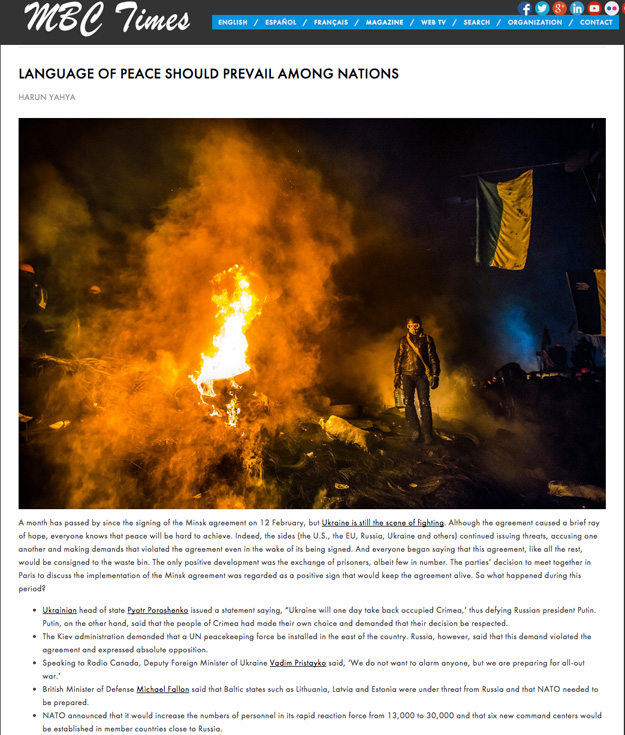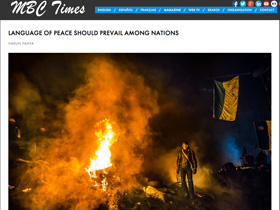
A month has passed by since the signing of the Minsk agreement on 12 February, but Ukraine is still the scene of fighting. Although the agreement caused a brief ray of hope, everyone knows that peace will be hard to achieve. Indeed, the sides (the U.S., the EU, Russia, Ukraine and others) continued issuing threats, accusing one another and making demands that violated the agreement even in the wake of its being signed. And everyone began saying that this agreement, like all the rest, would be consigned to the waste bin. The only positive development was the exchange of prisoners, albeit few in number. The parties’ decision to meet together in Paris to discuss the implementation of the Minsk agreement was regarded as a positive sign that would keep the agreement alive. So what happened during this period?
- Ukrainian head of state Pyotr Poroshenko issued a statement saying, “Ukraine will one day take back occupied Crimea,’ thus defying Russian president Putin. Putin, on the other hand, said that the people of Crimea had made their own choice and demanded that their decision be respected.
- The Kiev administration demanded that a UN peacekeeping force be installed in the east of the country. Russia, however, said that this demand violated the agreement and expressed absolute opposition.
- Speaking to Radio Canada, Deputy Foreign Minister of Ukraine Vadim Pristayko said, ‘We do not want to alarm anyone, but we are preparing for all-out war.’
- British Minister of Defense Michael Fallon said that Baltic states such as Lithuania, Latvia and Estonia were under threat from Russia and that NATO needed to be prepared.
- NATO announced that it would increase the numbers of personnel in its rapid reaction force from 13,000 to 30,000 and that six new command centers would be established in member countries close to Russia.
- Ukrainian Prime Minister Yatsenyuk claimed that Hitler’s Germany, which slaughtered millions of people, had been attacked by the Soviet Union. The Russian administration protested that statement and said that he insulted the memory of Soviet troops.
- Canada decided on new sanctions against Russia. Russian Foreign Ministry spokesman Lukashevich described this as an attempt to prevent the implementation of the Minsk agreement.
- Another move that would raise tensions with Russia came from the U.S. and Great Britain. ‘Narva, an Estonian town on the border of Russia’ was chosen for a military ceremony marking Estonian Independence Day. U.S. armored vehicles and British troops appeared alongside the Estonian Army at the ceremony.
- British Prime Minister Cameron said that British military personnel would be sent to Ukraine to support training there and claimed that ‘Putin can threaten Baltic countries or Moldova if he is not reined in.’
- U.S. State Department spokesman Jen Psaki said, "If Russia and the separatists continue to violate the agreement they have signed, that will lead to greater costs and isolation.”
These threats, statements and shows of force to alarm Russia followed one another in the wake of the Minsk agreement. But will this language of war help to bring about peace in Ukraine? Of course not; these statements will simply encourage further conflict, raise tensions and impede peace initiatives.
However, rational voices are also being heard from Europe. One example is Hungarian Prime Minister Viktor Orban, who said, "I do not want to live in a Europe engaged in a new cold war with Russia or which sets Europeans against Russians. The future of Europe will be shaped in line with its relations with Russia." Lithuanian Defense Minister Raimonds Vejonis contradicted British Minister of Defense Michael Fallon, and said that Russia did not pose a threat to the Baltic countries. The Czech Republic and Greece also favor the abandonment of sanctions against Russia. Led by German Chancellor Angela Merkel, a number of EU leaders are aware that war will spell ruin for the EU as well as for Russia, for which reason they oppose arming Ukraine and refuse to abandon diplomacy.
Differences of opinion about Ukraine between the EU and the USA are therefore very sharp. Aware of this difference of opinion, Russia has not severed relations with the EU. It has forced European countries to negotiate and compromise by banning imports. Russia has also suffered in that process, but we must not forget that Putin enjoys 85% support at home and that these challenges will further increase that support. It has powerful gold and foreign exchange reserved and unemployment is around the 5.3% level. Therefore, although economic difficulties are occurring, we must not expect Russia to bend their knee in the face of sanctions. It must also not be forgotten that sanctions are basically hurting the Russian people. Putin’s hand is also strong in Ukraine, which is presently divided in practice. It is impossible for the Kiev regime, which is unable to control the Ukraine-Russian border, to emerge victorious from this conflict or to make a choice between the two sides. Ukraine will always have to be a buffer state between the West and Russia and it will have to build consensus with Russia; arming Ukraine is therefore no way out. On the contrary, this will mean the fires of war burning all of Europe because in that event, Putin will enjoy the support of the whole country and respond with all his military might. In addition, everyone is aware that Ukraine cannot defeat Russia with weapons arriving from the West. The West will obviously be stuck in a difficult position if Russia involves its air force Sending arms to Kiev will therefore work in Russia’s favor. It is the right step for EU leaders, who are aware of this, to be unwilling to drag all of Europe into a state of war and to seek a negotiated agreement with Russia.
Indeed, in an interview with Russian television the other day, Putin stated that war with Ukraine would never happen, and continued, "I think that such an apocalyptic scenario is unlikely and I hope this will never happen.[i]
This is of course a fine hope. As for the solution, it is easy. We can go back to the days when Putin said, in the German Reichstag in 2001, “Russia is a friendly European country and wants a stable peace in Europe.” These concerns of Russia’s, which feels threatened by the expansion of NATO and the EU in Eastern and Central Europe, must be overcome. There must be an end to threatening talk and manuvers. For the stability and security of Europe - and the world - we must understand Russia, heed the demands for peace and look for ways to compromise. Maintaining this tension will benefit nobody. Nobody has the right to abandon the innocent Ukrainian people in this climate of conflict. For all these reasons, the language of threats and war must be abandoned.
[i] http://www.independent.co.uk/news/world/europe/ukraine-crisis-vladimir-putin-says-war-with-russia-would-represent-apocalyptic-scenario-for-eastern-europe-10067197.html
Adnan Oktar's piece on MBC Times:
http://www.mbctimes.com/english/language-of-peace-should-prevail-among-nations


